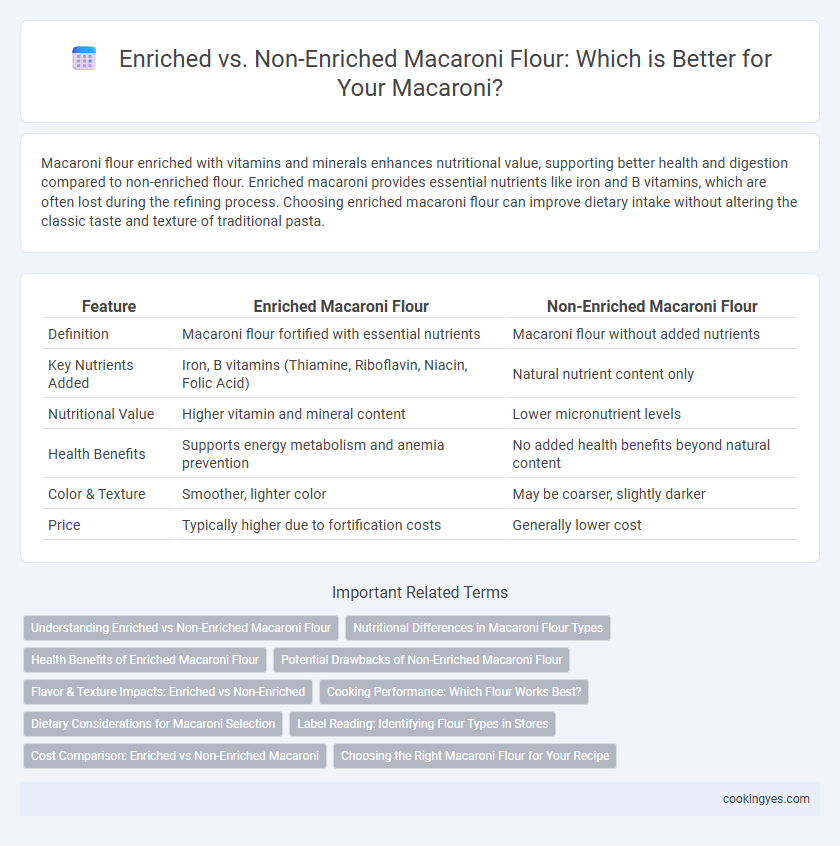Macaroni flour enriched with vitamins and minerals enhances nutritional value, supporting better health and digestion compared to non-enriched flour. Enriched macaroni provides essential nutrients like iron and B vitamins, which are often lost during the refining process. Choosing enriched macaroni flour can improve dietary intake without altering the classic taste and texture of traditional pasta.
Table of Comparison
| Feature | Enriched Macaroni Flour | Non-Enriched Macaroni Flour |
|---|---|---|
| Definition | Macaroni flour fortified with essential nutrients | Macaroni flour without added nutrients |
| Key Nutrients Added | Iron, B vitamins (Thiamine, Riboflavin, Niacin, Folic Acid) | Natural nutrient content only |
| Nutritional Value | Higher vitamin and mineral content | Lower micronutrient levels |
| Health Benefits | Supports energy metabolism and anemia prevention | No added health benefits beyond natural content |
| Color & Texture | Smoother, lighter color | May be coarser, slightly darker |
| Price | Typically higher due to fortification costs | Generally lower cost |
Understanding Enriched vs Non-Enriched Macaroni Flour
Enriched macaroni flour contains added nutrients such as iron, folic acid, and B vitamins, which are often lost during the milling process, enhancing the nutritional profile of the final product. Non-enriched macaroni flour, on the other hand, retains its natural nutrient content without fortification, appealing to consumers seeking minimally processed options. Choosing between enriched and non-enriched flour impacts the dietary benefits, cooking properties, and labeling requirements of macaroni products.
Nutritional Differences in Macaroni Flour Types
Enriched macaroni flour is fortified with added vitamins and minerals such as iron, folic acid, and B vitamins, enhancing its nutritional profile compared to non-enriched flour, which lacks these enhancements. Non-enriched macaroni flour retains its natural nutrient content but may fall short in essential micronutrients, impacting its overall health benefits. The choice between enriched and non-enriched flour affects dietary intake, particularly for populations relying on macaroni as a staple carbohydrate source.
Health Benefits of Enriched Macaroni Flour
Enriched macaroni flour contains added vitamins and minerals such as iron, folic acid, and B vitamins, which help prevent nutrient deficiencies and support overall health. Consuming enriched macaroni can contribute to improved energy metabolism, enhanced immune function, and better red blood cell production compared to non-enriched varieties. This fortified nutritional profile makes enriched macaroni flour a beneficial choice for maintaining essential nutrient intake in balanced diets.
Potential Drawbacks of Non-Enriched Macaroni Flour
Non-enriched macaroni flour lacks essential nutrients such as iron, thiamin, niacin, and riboflavin, which are typically added during the enrichment process to improve nutritional value. Consuming non-enriched macaroni flour may contribute to deficiencies in these vitamins and minerals, potentially impacting energy metabolism and overall health. This lack of fortification reduces the flour's ability to meet dietary needs compared to enriched options.
Flavor & Texture Impacts: Enriched vs Non-Enriched
Enriched macaroni flour typically contains added vitamins and minerals such as iron, thiamine, and niacin, which can slightly enhance the dough's nutritional profile without significantly altering flavor. Non-enriched macaroni flour often retains a more natural wheat taste, leading to a subtly nuttier and robust flavor profile in the finished pasta. Texture-wise, enriched flours may result in a smoother, more uniform macaroni, while non-enriched flours can produce a coarser texture that affects pasta bite and mouthfeel.
Cooking Performance: Which Flour Works Best?
Enriched macaroni flour contains added vitamins and minerals such as iron and B vitamins that enhance nutritional value without compromising cooking performance, resulting in firmer pasta with less stickiness. Non-enriched flour can produce macaroni with a softer texture but may lead to increased breakage and less ideal cooking consistency. For optimal cooking performance and durability in macaroni production, enriched flour is generally preferred by manufacturers and chefs.
Dietary Considerations for Macaroni Selection
Enriched macaroni flour contains added vitamins and minerals such as iron and B vitamins, which can support nutritional intake and help prevent deficiencies. Non-enriched macaroni flour typically lacks these added nutrients, making it a less nutrient-dense option but often favored for those seeking a more natural product with fewer additives. Dietary considerations for macaroni selection should account for individual nutritional needs, including conditions like anemia or vitamin B deficiency, and preferences for whole-food ingredients versus fortified options.
Label Reading: Identifying Flour Types in Stores
When reading macaroni labels, enriched flour contains added nutrients like iron, niacin, and folic acid, which compensate for losses during processing, while non-enriched flour lacks these fortifications. Identifying enriched versus non-enriched flour on packaging helps consumers make informed choices based on nutritional needs and dietary preferences. Labels often list "enriched wheat flour" or "refined wheat flour" for enriched macaroni, whereas "whole wheat flour" or simply "wheat flour" may indicate non-enriched varieties.
Cost Comparison: Enriched vs Non-Enriched Macaroni
Enriched macaroni flour typically costs more than non-enriched varieties due to the added vitamins and minerals such as iron, folic acid, and B vitamins. The enrichment process increases production expenses, impacting the final price for manufacturers and consumers. However, the nutritional benefits often justify the higher cost, especially in markets where dietary fortification is crucial.
Choosing the Right Macaroni Flour for Your Recipe
Choosing the right macaroni flour involves understanding the difference between enriched and non-enriched options, where enriched flour contains added nutrients like iron and B vitamins to enhance nutritional value. Non-enriched macaroni flour retains its natural components and is preferred for recipes seeking a more traditional, less processed ingredient. Selecting enriched flour supports fortified nutrition in everyday meals, while non-enriched flour suits recipes prioritizing natural texture and flavor.
Enriched vs Non-Enriched for Macaroni Flour Infographic

 cookingyes.com
cookingyes.com